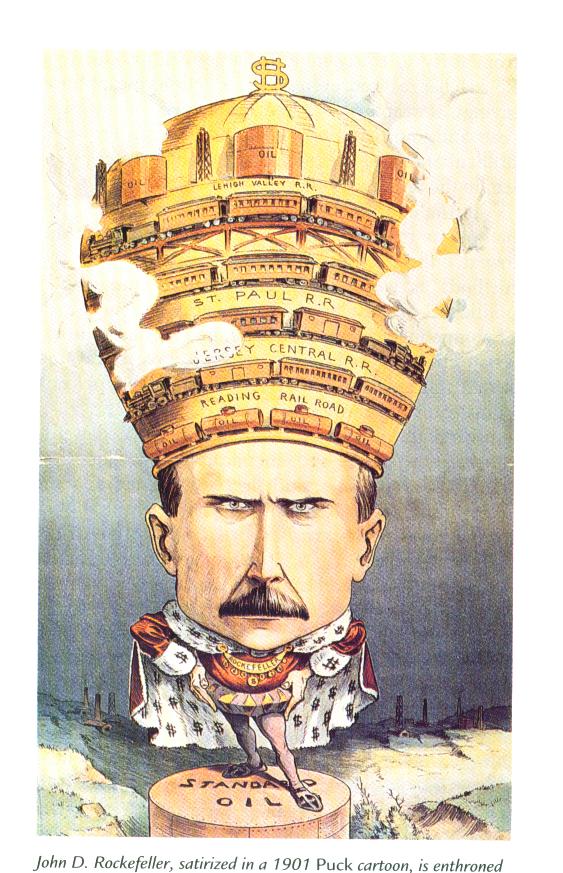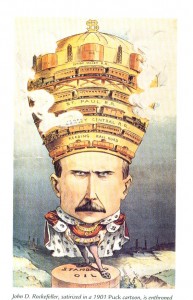Wire fraud and mail fraud are extremely serious federal crimes. Thousands of people who have perpetrated fraud through the mail or through telecommunications of any sort have been sent to prison for up to 20 years. The U.S. Department of Justice warns that prosecution of wire fraud is not always merited, however. Prosecutorial resources should not be expended where fraud is a small piddling crime. For example:
Prosecutions of fraud ordinarily should not be undertaken if the scheme employed consists of some isolated transactions between individuals, involving minor loss to the victims, in which case the parties should be left to settle their differences by civil or criminal litigation in the state courts. Serious consideration, however, should be given to the prosecution of any scheme which in its nature is directed to defrauding a class of persons, or the general public, with a substantial pattern of conduct.
What, then, should we make of the decision by the biggest banks in the United States to spew millions of lies through the mail in the zealous attempts to kick people out of their houses? Everything about this bank fraud meets the test for
serious fraud. Not isolated. Not between individuals. Not involving minor losses to victims. The victims, for the most part, cannot settle their differences by litigation because they have been put into desperate financial situations by the lenders, working hand-in-hand with the bank. And yes, this scheme is directed to defrauding a large class of persons, and the general public is going to suffer the consequences of this "substantial pattern of conduct," namely, the large tracts of foreclosed homes in their neighborhoods.
Note too, that the federal fraud statutes kick up the penalty to
up to 30 years in prison "if the violation affects a financial institution." Of course, the politicians and bank are going to argue that the increased penalty only applies if the institution is the
victim. Then maybe it's time to pull out that wonderful quote by Anatole France:
The law, in its majestic equality, forbids the rich as well as the poor to sleep under bridges, to beg in the streets, and to steal bread.
In steps bank regulator/investigator William Black, into the fray. Black is one of the few nationally prominent voices I completely trust with it comes to the conduct of banks over the past few years (and yes, decade).
Here is the solution Black offers, one that politicians are going to choke on because the banks own Congress.
S&L regulators, criminologists, and economists recognize that the same recipe that produced guaranteed, record (fictional) accounting income (and executive compensation) until 2007 produced another guarantee: massive (real) losses, particularly if the frauds hyper-inflated a bubble. CEOs who loot "their" banks do so by perverting the bank into a wealth destroying monster -- a control fraud. What could be worse than deliberately growing massively by making loans likely to default, converting large amounts of bank assets to the personal benefit of the senior officers looting the bank and to those the CEO suborns to assist his looting (appraisers, auditors, attorneys, economists, rating agencies, and politicians), while simultaneously providing minimal capital (extreme leverage) and only grossly inadequate loss reserves, and causing bubbles to hyper-inflate?
This nation's most elite bankers originated and packaged fraudulent nonprime loans that destroyed wealth -- and working class families' savings -- at a prodigious rate never seen before in the history of white-collar crime. They created the worst bubble in financial history, echo epidemics of fraud among elite professionals, loan brokers, and loan servicers, and would (if left to their own devices) have caused the Second Great Depression.
Nothing short of removing all senior officers who directed, committed, or acquiesced in fraud can be effective against control fraud. We repeat: Foreclosure fraud is the necessary outcome of the epidemic of mortgage fraud that began early this decade. The banks that are foreclosing on fraudulently originated mortgages frequently cannot produce legitimate documents and have committed "fraud in the inducement." Now, only fraud will let them take the homes. Many of the required documents do not exist, and those that do exist would provide proof of the fraud that was involved in loan origination, securitization, and marketing. This in turn would allow investors to force the banks to buy-back the fraudulent securities. In other words, to keep the investors at bay the foreclosing banks must manufacture fake documents. If the original documents do not exist the securities might be ruled no good. If the original docs do exist they will demonstrate that proper underwriting was not done -- so the securities might be no good. Foreclosure fraud is the only thing standing between the banks and Armageddon.
I should add that there are many cases where foreclosure is perfectly appropriate. On the other hand, there are hundreds of thousands of cases where disreputable loan originators such as Ameriquest and Countrywide systematically lied to borrowers, sticking them into loans that the borrowers had no hope of paying off when the hyper-charged "adjustable rate mortgage" came into effect two or three years later. Add in the deceitful "yield spread premiums," hidden fees and the many lies about prepayment penalties, and you've got enough fraud to fill the courts of this land for many years to come, where banks who foreclosed based on these shameful scenarios should be punished and forced to make amends to the homeowners.
That is what should happen.



